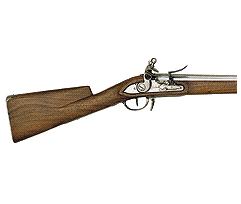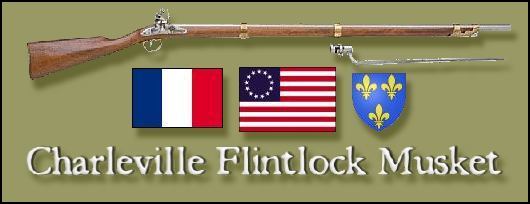Charleville Flintlock Musket. Instrumental in the Founding of the United States.

Given the long, contentious history
between France and England prior to the outbreak of the American War of
Independence or the Revolutionary War, it is not surprising to learn
that the French were selling weapons to the American
revolutionaries who were at
war with their enemies. Of course this had to be done on the sly.
Sometimes by faking manifests on shipments, by the use of
false
companies, or whatever other tactics were needed to get the weapons
into the Colonies. Among other periods, the British and
French
were also at war from 1793 to 1802. France and England had
been
at war, off and on since medieval times. Not only did the
Americans use the French muskets against the British, but in the War of
1812, the Canadians used them against the Americans. They
also
used the British Brown Bess muskets against Britain in the war, but
that's a story for another page.
The Charleville flintlock musket saw heavy use in
the American War of
Independence against the British from 1775 to 1783. It was named after
the armory at Charleville-MÈziËres, Ardennes, France. The Charleville
musket was designed originally in 1717, and went through a number of
modifications until about 1777. Quite a number of the
Model
1728 muskets turned up in Canada in the early stages of the War of 1812
due to there being a large store of the weapons in French-Canadian
arsenals. By far, the majority of
Charleville muskets used in the American War for Independence were the
Model 1766. France had a large number of these 1766 muskets
stored in its St. Etienne arsenal, and the Marquis de LaFayette
delivered 25,000 of these muskets
to General George Washington as an honorary gift, helping to turn the
tide against the
British. After the war, as America developed its own
arsenals in Springfield, Massachusetts and Harpers Ferry, Virginia (now
West Virginia) the French design was highly evident. American
weapon
design was heavily influenced (in some cases, downright copied) by
French design well into the American Civil War.

The Charleville musket
was smaller and lighter than the impressive "Brown Bess", a British
flintlock musket used by both the Americans and the British in the war.
Using the Charleville, skilled soldiers were able to get off as many as
3 shots in a minute, loading the powder and ramming the .69 caliber
lead ball into the muzzle. While smaller than the .75 caliber
ball fired by the Brown Bess musket, the .69 is still massive compared
to modern bullet sizes, and the Charleville had been lightened
considerably from earlier models, which surely must have been a welcome
change to the infantry soldiers who carried them.
Even though smoothbore muskets were nowhere near as
accurate as rifles,
the rifle did not become a standard infantry weapon until well into the
next century. The spiral grooves inside the barrel of a rifle spin the
projectile, adding stability and accuracy that was lacking on
smoothbore muskets. But what the musket lacked in accuracy, it more
than made up for in brute force. A large lead ball shot out
of a
smoothbore musket definitely made for a formidable projectile, that did
more damage than even today's much more advanced weapons. Both the
Charleville and Brown Bess muskets could be fitted with bayonets for
when things got close. It must also be understood that
military
tactics of the time were considerably different than they are today.
With muskets, shots were fired en masse, in ordered "volleys"
which would lay down a veritable cloud of destructive power.
Most
people don't want to be standing around when the sky is raining .69
caliber lead balls.
Firearm Type:
Fllintlock Musket
Nation Of Manufacture: France
Military Service Dates : 1717-1816
Variations: Many models, named after years
from 1717-1777
Ammunition: .69 Musket Ball
Wars: French Revolution, Napoleonic Wars,
American War of Independence, others
Recent Prices at Auction for Originals: US
$1000-$3,000+
Interested in an authentic replica Charleville Flintlock Musket?
We also have the Carbine
version of the Charleville Musket available.